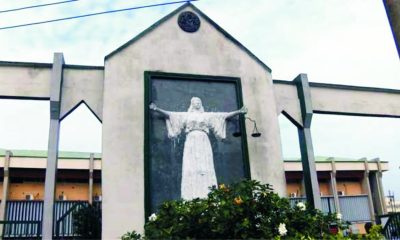Business
Electricity Consumers Knock PHED Over Poor Services
Electricity consumers in
Akwa Ibom State have accused the Port Harcourt Electricity Distribution Company (PHED) of fraudulently extorting unsuspecting consumers without corresponding power supply.
The consumers said the power company has completely neglected their responsibilities to members of the public, and made circulation of outrageous bills the most regular and visible aspect of their services to the people.
Speaking with our correspondent in Uyo, the Akwa Ibom State capital, a resident of Anwa Nsa Street, Uyo, Mr. Idongesit Ekpenyong, expressed disappointment that such alleged fraudulent activities could be allowed to go unabated in the state.
Ekpenyong alleged that the entire PHED team in Akwa Ibom has displayed high sense of irresponsibility and fraud against members of the public by forcefully and constantly placing charges for services not rendered.
He said the policy of estimated billing system was the company’s calculated plan to maximise profit at the expense of the public, as any appropriate billing system would have revealed the true state of services rendered.
Citing his street’s experience, for instance, the consumer expressed disappointment that after one year of total blackout due to faulty transformer, PHED, after installation of a new transformer, facilitated by one of the residents, sent in bills covering the one year period of the total blackout.
His words: “Imagine a situation where you had no light in your area, not even a flash for one full year, and for this reason, there was absolutely no point bringing in any bill, but after one year, one of the residents of the area facilitated installation of a new transformer, and two weeks after the new transformer was installed, they brought in bills covering the entire period of total blackout.
“So ridiculous it was that some flats were receiving bills of N150,000, and single rooms N50,000 to N70,000.
“As though such daylight robbery was not enough, PHED team came after a month to disconnect cables from virtually every building because no one agreed to succumb to that high level of fraud.
“Some of us had to go to their office to complain about the one full year of blackout, and the illegality of the bills, and they advised us to apply, which we did. Till this moment, our bills are still coming with the backlog of charges for power not supplied,” he added.
Ekpenyong, therefore, called on the Akwa Ibom State Government to call PHED to order, and desist from extorting members of the public for services not rendered.
Another consumer and resident of Akpan Ukpo, of Esuene Street, Mr Isaiah Udofia, criticised PHED for defiling every sense of responsibility and duty owed members of the public with its intolerable activities.
According to Udofia, the company has adopted a strategy of supplying electricity to most streets in Uyo just within 48 hours to enable its team conclude the distribution of bills.
He said: “If you are resident in Uyo, observe these people closely, you would notice that they usually bring light two days to the 15th day of every month, within which they usually circulate bills, and the moment they are done with that, the light cut off till same time next month.
“In addition to poor electricity power, the bills have also become so high that one is left to wonder if power bill is the only thing one should be paying with his monthly income. While some apartments are receiving bills of between N8,000 and N12,000 every month, single bedrooms are charged as high as N5,000 every month. I honestly do not understand what these people are up to Udofia said.”
This followed a notice of motion brought before the House by member representing Ibesikpo Asutan State Constituency, Mr. Aniekan Uko, during one of its plenary sessions.
The motion was titled: “The unwholesome and alleged fraudulent charges on electricity consumers in Akwa Ibom State by PHED”.
Uko frowned at a situation where electricity consumers, particularly in rural communities, were made to pay accumulated tariff even when they never consumed or had power supply within the period.
He prayed the House to urge the management of PHED to be responsible for the repairs, replacement and purchase of broken down electricity equipment as stipulated by Nigerian Electricity Regulatory Commission (NERC).
“A situation where electricity consumers, including unmetered houses and communities neither enjoy quality electricity supply nor see light for months due to prolonged breakdown of electricity equipment like the transformer but made to replace, repair or buy the transformer is far from being transparent”, he said
Lawmakers who spoke on the matter, including Leader of the House and member representing Oruk Anam State Constituency, Udo Kierian Akpan, and member representing Mbo, Samuel Ufuo, stressed the need for the House to interface with the management of the PHED and other institutions, especially affected by the situation.
This, they submitted would help them come up with a lasting solution to the lingering problem.
The Speaker, Hon Onofiok Luke, after listening to the submissions, urged the House Committee on Rural Development and Public Utilities as well as the Committee on Commerce, Industry and Tourism, to harmonize the two motions and submit report to the House within two weeks.
Efforts to reach the state Public Affairs Manager of PHED, Mr John Onyi, proved abortive as he neither picked his calls nor replied text messages sent to his phone.
Imah Utip
Business
NPA Assures On Staff Welfare
Business
ANLCA Chieftain Emerges FELCBA’s VP
Business
NSC, Police Boost Partnership On Port Enforcement
-

 News5 days ago
News5 days agoReps Probe Police Over Alleged ?6bn Contract Splitting, Asset Sales
-

 Niger Delta5 days ago
Niger Delta5 days agoRSNC Head Charges NAOMEW On Professionalism, Effective Service Delivery
-
Sports5 days ago
Give Rest Of ‘94 Eagles Their Houses – Amuneke
-

 News5 days ago
News5 days agoRivers High Court Judges Begin 2025 Vacation, July 21
-
Rivers5 days ago
Obalga SOLAD Presents Fire Extinguishers To Council …. Commiserates With traders over Rumuomasi Market Fire
-
Business5 days ago
NPA Assures On Staff Welfare
-

 News5 days ago
News5 days agoFour Internet Fraudsters Get Jail Sentences In PH
-
Sports5 days ago
President Federation Cup: Sanwo-Olu, Abdulrazaq Set To Grace Grand Finale

